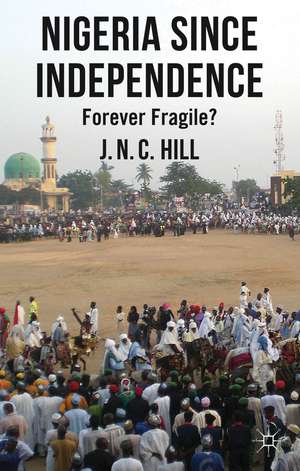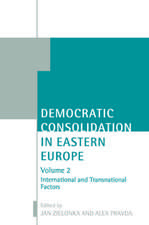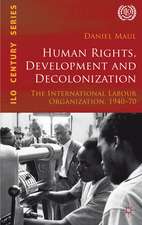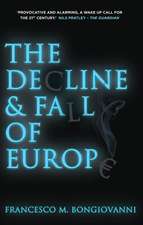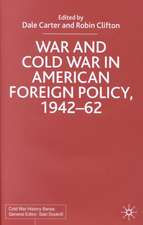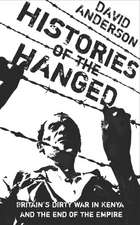Nigeria Since Independence: Forever Fragile?
Autor J. Hillen Limba Engleză Hardback – 10 oct 2012
| Toate formatele și edițiile | Preț | Express |
|---|---|---|
| Paperback (1) | 379.86 lei 6-8 săpt. | |
| Palgrave Macmillan UK – 2012 | 379.86 lei 6-8 săpt. | |
| Hardback (1) | 385.84 lei 6-8 săpt. | |
| Palgrave Macmillan UK – 10 oct 2012 | 385.84 lei 6-8 săpt. |
Preț: 385.84 lei
Nou
Puncte Express: 579
Preț estimativ în valută:
73.85€ • 80.25$ • 62.08£
73.85€ • 80.25$ • 62.08£
Carte tipărită la comandă
Livrare economică 21 aprilie-05 mai
Preluare comenzi: 021 569.72.76
Specificații
ISBN-13: 9780230298521
ISBN-10: 0230298524
Pagini: 173
Ilustrații: XIII, 173 p.
Dimensiuni: 140 x 216 x 20 mm
Greutate: 0.36 kg
Ediția:2012
Editura: Palgrave Macmillan UK
Colecția Palgrave Macmillan
Locul publicării:London, United Kingdom
ISBN-10: 0230298524
Pagini: 173
Ilustrații: XIII, 173 p.
Dimensiuni: 140 x 216 x 20 mm
Greutate: 0.36 kg
Ediția:2012
Editura: Palgrave Macmillan UK
Colecția Palgrave Macmillan
Locul publicării:London, United Kingdom
Cuprins
Introduction Fear of Failure: Negative Sovereignty and the Birth of State Failure The Causes and Consequences of State Failure Identifying Failed States Failure to promote human flourishing The spread and spread of the concept of state failure Conclusions The Enemy Within: Insurgency and the Failure of the Nigerian State The Ways and Extent of Nigeria's Failure Boko Haram The MEND Failure to Control Failure to Promote Human Flourishing Failure to Provide Security Failure to Provide Healthcare and Education The Dangers of Disintegration Conclusions The Emperor's New Clothes? Federalism, the Decline of Old Loyalties and the Rise of New Jealousies The Post-independence Background to Federalism The Function of Federalism 'Not a Nation': Federalism and the Preservation of Difference A Spur to Ethnic Tensions Damage to National Unity Damage to Political Rights Corruption Out of Many Came Forth One: Federalism and the Quest for Unity Conclusions Fuel to the Flames: Oil and Political Violence in Contemporary Nigeria Oil and its Lubrication of Nigeria's Failure Damage to the Economy Damage to the Environment Corruption Damage to Democracy Failure to Promote Human Flourishing and the Spread of Armed Violence Secessionism On Troubled Waters: Oil and its Contribution to Nigeria's Unity Conclusions Of the People but for the People? Nigeria and its Armed Forces The Legacy and Reputation of Nigeria's Armed Forces The Armed Forces' Contribution to Nigeria's Failure A Failure to Defend The Abuse of Human Rights The Armed Forces' Efforts to Prevent Nigeria's Failure Maintaining and Preserving Security Strengthening Public Participation and Trust in the Political Process Promoting Social Integration and Harmony Conclusions Conclusion Selected Bibliography
Recenzii
Winner of the CHOICE Award for Outstanding Academic Titles in 2014
"The timing of the book could not have been better, in the wake of Boko Haram's assaults and atrocities perpetrated on innocent
bystanders in central and northern Nigeria. It is a must read for scholars and policy makers concerned with conflict and state failure in Nigeria."
- CHOICE
"Hill's is a paradoxical book. He points out that Nigeria is a construct that has almost fallen apart several times since Lugard decreed its birth. He contends that its failure and continued unity are the result of three key mechanisms federalism, oil and
the armed forces."
- The Round Table: The Commonwealth Journal of International Affairs
"Hill's book thoroughly showcases Nigeria's failure and continued unity as a product of complex and contradictory roles [...] His analysis significantly contributes to the ongoing debates over state failure and Nigeria's threatened existence as one of the largest democracies in Africa."
- CGIS-FMSO Blog
"[...] The binary nature of the core analytical chapters will provide readers including those new to Nigeria with effective information for making up their own minds. Hill's latest work deploys graceful prose, well-placed anecdotes and the necessary sensitivity to Nigeria's complexities." - Journal of Modern African Studies
"This book adds useful insights to our understanding of the challenges of statebuilding in Nigeria and should be of keen interest to those interested in African politics" - International Affairs
"The timing of the book could not have been better, in the wake of Boko Haram's assaults and atrocities perpetrated on innocent
bystanders in central and northern Nigeria. It is a must read for scholars and policy makers concerned with conflict and state failure in Nigeria."
- CHOICE
"Hill's is a paradoxical book. He points out that Nigeria is a construct that has almost fallen apart several times since Lugard decreed its birth. He contends that its failure and continued unity are the result of three key mechanisms federalism, oil and
the armed forces."
- The Round Table: The Commonwealth Journal of International Affairs
"Hill's book thoroughly showcases Nigeria's failure and continued unity as a product of complex and contradictory roles [...] His analysis significantly contributes to the ongoing debates over state failure and Nigeria's threatened existence as one of the largest democracies in Africa."
- CGIS-FMSO Blog
"[...] The binary nature of the core analytical chapters will provide readers including those new to Nigeria with effective information for making up their own minds. Hill's latest work deploys graceful prose, well-placed anecdotes and the necessary sensitivity to Nigeria's complexities." - Journal of Modern African Studies
"This book adds useful insights to our understanding of the challenges of statebuilding in Nigeria and should be of keen interest to those interested in African politics" - International Affairs
Notă biografică
J.N.C HILL is Senior Lecturer in the Defence Studies Department at King's College London, UK. He has published widely on issues of African security. His main publications are Remembering the War of Liberation: Legitimacy and Conflict in Contemporary Algeria, Sufism in Northern Nigeria: A Force for Counter-Radicalisation?, Identity in Algerian Politics: The Legacy of Colonial Rule, Islamism and Democracy in the Modern Maghreb, and Corruption in the Courts: The Achilles Heel of Nigeria's Regulatory Framework?
